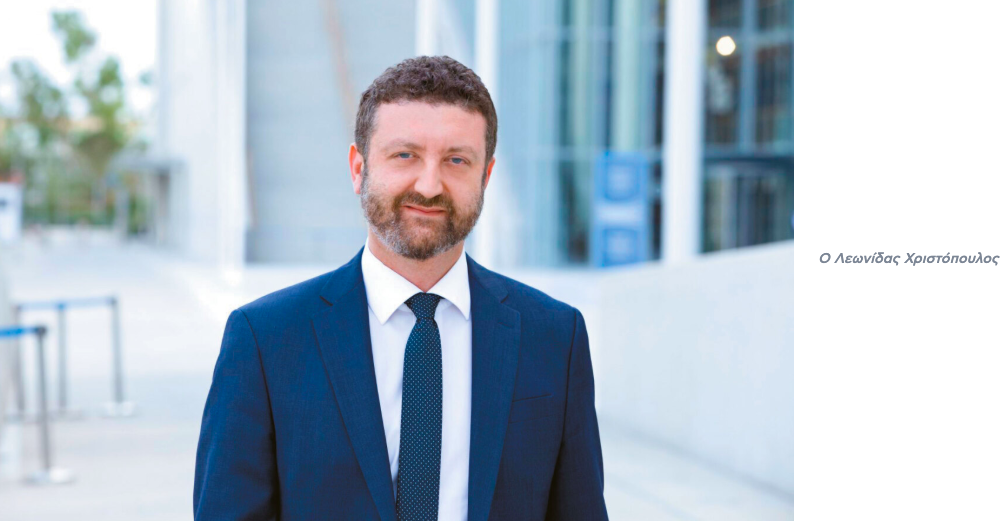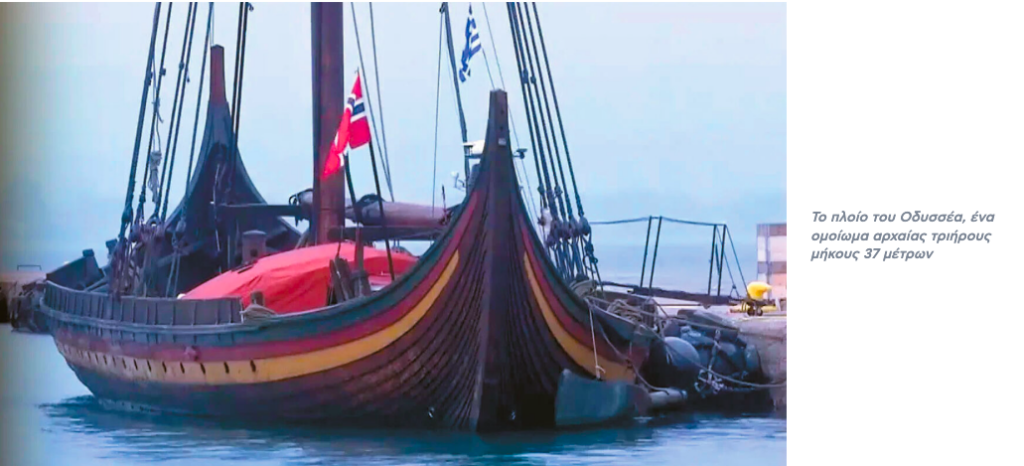In Nestor’s cave in Boydoubt, torchlight flickers on the rough walls, creating dancing shadows. Matt Damon, in the role of Odysseus, stands before the imposing mechanical likeness of Cyclops Polyphemus that technicians have been constructing for months, ready to perform worthy of his name. The crew watches in silence while cameras record every detail with absolute precision.
The above fantastic scene will become a reality in a few days as preparations for the in-country shooting of the new film by acclaimed director Christopher Nolan, “Odyssey”, enter the final stretch. This is the cinematic adaptation of the Homeric epic, which the famous director has been preparing for some time now by gathering around him a dream team of actors, which along with Matt Damon includes Ann Hathaway (as Penelope), Tom Holland (Telemachus), Sarlize Theron (Calypso), Lupita Niongo (Circe), Zendaya (Athena) and Robert Patinson (Neptune), and who are expected to come to Greece in the coming days, bringing a little Hollywood glamour to Messinia and Corinthia, where the filming will take place.

The government is banking on the prestige of such a major production, backed by Universal, to give new momentum to the effort to make Greece an important player in international audiovisual production and, of course, to reap the benefits of international promotion in tourism and beyond. The timing is particularly favorable since last week, the new organization that emerged from the merger of the Hellenic Film Centre and the former EKOMED, EKKOMED started accepting applications for the support programs for audiovisual productions that can bring investments and added value to the Greek economy.

Preparations
According to reports, “Odyssey” is expected to receive from EKKOMED very close to the €8 million ceiling, which has been set as a reimbursement for production made in Greece. But an amount that is less than twice as much as the benefits it can bring to the Greek economy both directly and indirectly, given that the film adaptation of the Homeric epic by the most popular and commercial director of our time – an Oscar winner just last year – is expected to bring the Odyssey and Greece back into the limelight when the film is released in the summer of 2026, according to Universal’s schedule.

Preparations for filming in Greece began in early February, with crews working hard to adapt the locations. The production company, NAFA Monopoly S.A., a subsidiary of Faliro House Productions, has mobilized more than 400 people, including actors, technicians, and crew members. In fact, from February 4 to 7, casting calls were held in Kalamata, Methon,i and Pylos for supporting Greek actors and extras to join the production. The production vehicles alone are approaching 150…
An important part of the preparations is to ensure the protection of the natural and cultural monuments of the areas where the filming will take place. In cooperation with local institutions and archaeological services, strict measures have been taken to avoid any harm to the environment and cultural heritage. For example, in the cave of Nestor, where the scenes with Cyclops Polyphemus will be filmed, geotextile and layers of sand will be placed to protect the cave during filming.

The shooting
Cameras in the huge outdoor film studio that western Messinia is being transformed into are expected to start rolling on March 10. The focus of the filming until March 12 will be the impressive castle of Methoni with its imposing presence and rich historical heritage. It is expected to host impressive scenes that are expected to take the audience on a journey back to the time of Odysseus. From 13 March onwards, filming will move to the cave of Nestor and the beach of Voidokilia.
From 13 May to the village of Vidioskoi and the Vidioskoi beach.
This is where the filming of Odysseus’s encounter with Cyclops Polyphemus will take place. The cave, with its particular geomorphology and its intense mythological value, will provide the ideal setting for one of the most dramatic scenes in the film. In fact, for the needs of the filming, a temporary six-metre-high mechanical anthropomorphic model is being constructed. At the same time, strict protection measures will be taken, with special geotextiles and layers of sand to prevent any damage to the natural space.

At the same time, the impressive beach of Voidokilia, with its golden dunes and crystal clear waters, will give a dreamy atmosphere to the film narrative. On March 21, Almyrolakkas beach will be transformed into the setting of a traditional Greek village, constructed with environmentally friendly materials, ensuring the protection of the natural environment. During the night shootings of this day, special fire effects will be used under the guidance and supervision of specialized pyrotechnicians. Filming in Greece will be completed at the end of the month, in Acrocorinth, where the castle and its historic atmosphere will be used for the needs of the production.
The benefits
How does all this translate for Greece, given that Nolan’s Odyssey is one of the most ambitious film projects of recent years? On the one hand, there is the direct economic benefit to the local economy, since over 400 people will be employed for the production of various skills. Local services and infrastructure (hotels, catering, etc.) will be used, with all that this implies, especially in a non-tourist period for the region.

They will have to be used in the context of the tourism sector.
But beyond that, there are several expectations of the general and lasting benefits it can bring. The obvious one is that the production of the film is expected to significantly boost tourism and the Greek economy. The cinematic portrayal of Greek landscapes in an international production of this magnitude will attract visitors from all over the world, who will want to visit the locations where the film was shot. Tourism businesses, from hotels and restaurants to tour guides and transportation companies, are expected to benefit from the increase in travelers interested in experiencing Odysseus up close.
Something the country has experienced before when a major film production focused on our country’s enchanting locations. The success of the musical “Mamma Mia!”, starring Meryl Streep, which was filmed in 2007 in Skopelos and Skiathos, caused a massive tourist influx to Sporades and our country in general from 2008 when the film was shown, which lasted for several years. Studies show that the film alone increased tourist traffic to the Sporades by 19% in five years!
This time with “Odyssey,” the international promotion of Greek locations can not only help tourism but also highlight the country as an attractive destination for the global film industry. On the one hand, the choice of Greece to film “The Odyssey” through the lens of Oscar-winning Christopher Nolan is a global recognition of the country as an authentic setting for mythology and history.
But beyond that, it can be an example of how the country can welcome and accommodate major productions at every level. And this can form the basis of the ultimate goal that is now being set, the gradual creation of a major film base, an ecosystem, linked to the global content production industry which will become a new channel of economic activity and growth.
Greek companies, such as Faliro Productions, to have a role and infrastructure that will now develop an industry that will grow investment-wise, financially, with the expectation of being able to contribute much more. At the same time it creates an avenue for Greek filmmakers to become better, to learn by international standards and then to find their place in the international market more easily, eventually claiming a bigger role, as few people have been able to do so far, such as director Giorgos Lanthimos.
7 billion euros
In general, it is estimated that if we follow roughly the model of Spain or Britain, reaching roughly the same results through triggering direct investment for the needs of producers, creating new jobs in multiple satellite industries, tourism promotion and the big ask, i.e. permanent investments with steady flows in our country that could be transformed into organized studios and so on, then the audiovisual industry can bring up to 3% of the country’s GDP, which means perip
To create the conditions for the country to move in this direction, the government proceeded to create the Hellenic Centre for Cinema, Audiovisual Media and Creation (EKCOMED), the organisation that succeeded the former EKOME and which now includes the Hellenic Film Centre.
EKKOMED is responsible for attracting such productions through a network of grants funded by the Public Investment Programme and the NSRF, as well as facilities such as filming permits, location management, and finding skilled human resources. In fact, since last Thursday, its platform has been open to accept new applications from productions interested in shooting in Greece and being part of the attractive “Cash Rebate” program.
“There is a lot of interest. We are already in talks with five major international productions that are exploring the prospect of shooting in Greece, so we are at a stage where after the restructuring of the organisation we have not only not disrupted our relations with the international network, but we have generated a lot of interest, since what has been set up now has solid foundations and realistic approaches,”
says the CEO of EKKOMED, or Creative Greece, as it is called abroad.
The Cash Rebate programme can reimburse up to 40% of eligible costs to film and TV productions shooting in Greece, with a maximum aid amount of €8m per project. An amount similar to the amount that the production company behind the filming of “Odyssey” in Greece will receive. In addition, there is also the “Tax Relief” programme, which provides for a 30% tax exemption for investments in audiovisual projects, enabling producers to significantly reduce overall production costs. This means that the combination of these two incentives can cover up to 50% of a project’s total budget.
“Nevertheless, even as a direct impact, the benefits for the Greek economy are greater,” says Christopoulos. “To date, €137.7 million had been provided in the form of the ESME for 221 projects under the Cash Rebate. For these, however, expenditures of €400 million were incurred in the country,” he adds.
Audiovisual hub
This year the budget for this programme is €105 million. “Of this, 81 million will be directed to film productions and 24 million to the productions of TV channels,” Christopoulos says and continues: “This will be followed by another €40m for animation and €10m for the production of video games in two actions that will open shortly afterwards. In other words, we have a €155 million budget for aid this year, plus somewhere another €7 million of so-called ‘selective programmes’. All this is, of course, a starting point, because really with the prospects that are being created the Centre’s firepower should increase for domestic and foreign productions made in Greece […]
From our side, we are trying to expand the mission of the institution through actions that we cannot touch. That is, new technologies, Artificial Intelligence, anti-piracy, etc. All this part concerning technology and innovation within the audiovisual sector, which is a huge issue. or cultural diplomacy through cinema and audiovisuals. Also, the part of gathering data, making a serious policy with it, and contributing to audiovisual education and training, etc. In other words, we are talking about a single national body with better funding and much more to do in terms of the audiovisual industry. So, what we are trying to do is to make Greece an audiovisual hub of Europe.”
New productions
The big gamble, of course, remains to increase investment in the country to create infrastructure, but also to build an ecosystem that will be interconnected with the global industry, given that no significant moves have been made in this direction in recent years, except perhaps the investment of Nu Boyana Hellenic Studios in Thessaloniki, which acts as a satellite of the large studios the company has in Bulgaria. Hence, several productions in recent years have been made in Macedonia.
“This will be the next phase, the big goal,” says Christopoulos. “To attract productions or to make good productions that go abroad on the one hand, but now to start making infrastructure. A whole industrial ecosystem should start to take shape. I think there is a golden opportunity because, at the moment, too many productions and too much capital are leaving America because of political developments. After all, Hollywood has become too expensive, and so on, and they are trying to come to Europe. So, the Europeans are competing to a certain extent with their financial tools to see who can attract more. So we can’t be missing out on that.”
Ask me anything
Explore related questions

